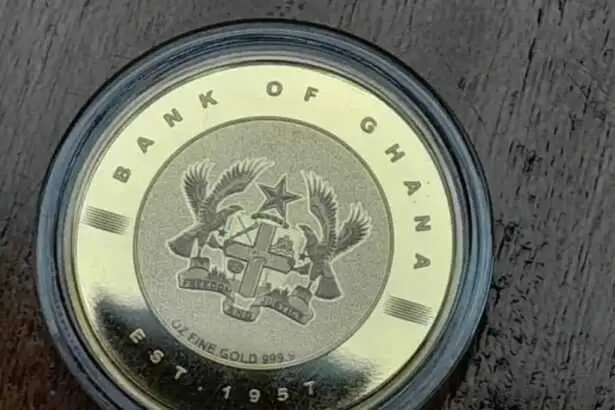Economist Professor Godfred Bokpin has voiced skepticism regarding the efficacy of the newly introduced Ghana Gold Coin as a solution to the persistent depreciation of the Ghanaian cedi. Unveiled by the Bank of Ghana (BoG) on September 27, 2023, the Ghana Gold Coin initiative is positioned as a strategy to mitigate dollar hoarding and bolster the local currency against major foreign currencies. This investment approach is part of a broader domestic gold program aimed at absorbing excess liquidity in the market. The Ghana Gold Coin will be available in three denominations—one ounce, half an ounce, and a quarter ounce— and is set to be sold through commercial banks in the coming weeks, with prices to be published on the BoG’s website.
Despite the BoG’s hopeful outlook, Professor Bokpin challenges the notion that the coin can effectively address the root causes of the cedi’s depreciation. In an interview on Eyewitness News, the professor expressed a lukewarm endorsement of the BoG’s intervention, acknowledging the scarcity of alternative financial avenues in the current market. However, he emphasized that the Ghana Gold Coin is not a comprehensive remedy to the depreciation issue. Instead, he underscored that the existing market conditions are severely influenced by a lack of confidence and broader economic management issues, asserting that while the coin provides an alternative, it does not address the fundamental problems contributing to the financial malaise.
Bokpin articulated that the introduction of the Ghana Gold Coin should not be perceived as a replacement for sound economic management. He pointed out that essential elements like fiscal discipline, enhancing local economic capacity, reducing import reliance, and adding value to raw commodity exports are critical factors that influence the cedi’s stability. He remarked that the BoG’s initiative must not be misconstrued as a standalone solution, as it fails to tackle the fundamental economic issues at hand. This sentiment reflects broader concerns among economists regarding overreliance on monetary interventions without addressing structural weaknesses in the economy.
The professor’s position highlights a common critique in economic discourse: that monetary tools alone cannot sustain long-term currency stability without a parallel focus on structural economic reforms. He emphasized that while the cedi’s depreciation is a significant concern, relying solely on investment instruments like the Ghana Gold Coin will not substitute the need for comprehensive economic strategy development. Effective economic management, according to Bokpin, is necessary to restore investor confidence and stabilize the local currency against inflationary pressures and currency depreciation.
In the context of Ghana’s economy, the need for a multifaceted approach that balances innovative financial initiatives with rigorous economic management becomes increasingly apparent. As the country grapples with currency stability, it must also prioritize developing sustainable economic policies that foster growth and resilience. Professor Bokpin’s insights serve as a reminder of the importance of addressing systemic issues rather than solely relying on financial instruments to manage currency challenges.
In summary, while the Ghana Gold Coin initiative represents a move towards providing alternative investment options in a struggling economy, experts like Professor Bokpin urge caution and realism. The deeper issues affecting the cedi’s value, such as economic confidence, fiscal responsibility, and export development, remain unaddressed. Thus, a comprehensive economic strategy combining innovative monetary tools with strong fiscal policies is essential for ensuring the long-term stability and integrity of Ghana’s currency and economy.














